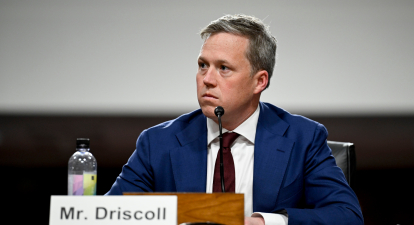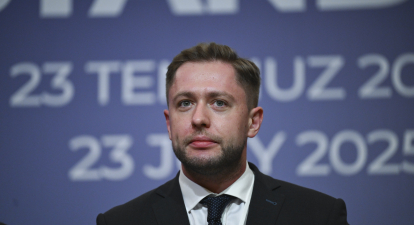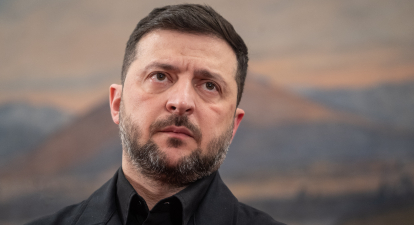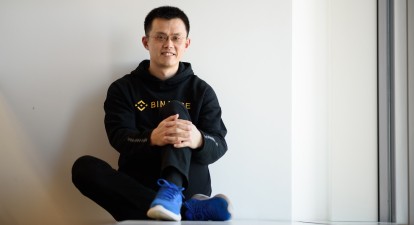
Binance helped launch Donald Trump's family's stablecoin – and this, according to the WSJ, was the key to the political pardon of its founder Changpeng Zhao Photo Getty Images
Changpeng Zhao's pardon has become one of the most high-profile political decisions in the US crypto industry. Why did US President Donald Trump decide to return freedom to a man whom Washington considered a national security threat just yesterday? The main points from the WSJ material
Buy an annual subscription to six Forbes Ukraine magazines for the price of four issues. If you value the quality, depth, and power of real-world experience, this subscription is for you.
The founder of the world's largest cryptocurrency exchange, Binance, Changpeng Zhao, served four months in the United States for years after his crypto exchange, Binance, allowed transactions to take place without proper customer verification. This allowed sanctioned Iranian crypto exchanges, Russian drug traffickers, Hamas militants, and other criminal groups to transfer billions of dollars through the exchange. The US administration under President Joe Biden in 2024 claimed that this behavior harmed the country's national security.
But just a year after his release, Zhao was pardoned by current US President Donald Trump. This was made possible after Binance helped promote the Trump family's crypto project World Liberty Financial and sharply increased the value of the associated stablecoin. The pardon paves the way for Zhao to return to the US market, from which Binance was effectively forced out in 2023.

Popular Category Money Date October 27 100 days of Svyrydenko's government. Forbes Ukraine collected 13 difficult questions from business for the Prime Minister. What she answered them
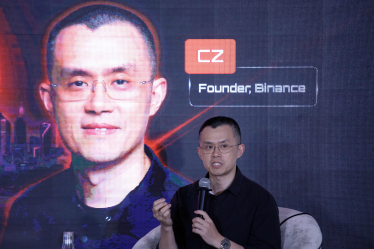
Changpeng Zhao, co-founder of Binance Holdings Ltd., during an event in Kuala Lumpur, Malaysia, April 22, 2025. Photo by Getty Images
Shadow money platform
Zhao's problems with the American regulatory system began long before his imprisonment in California's Lompoc Prison. Binance was built as an exchange “for everyone”, and it is this – the lack of strict identity checks, the unwillingness to cut off risky customers, the admission of jurisdictions under sanctions – that made it a major platform for shadow money, writes WSJ.
In 2023, the US Department of Justice, the Treasury Department and regulators forced him to make a deal: Zhao pleaded guilty to failing to ensure proper compliance, resigned as CEO of Binance and agreed to pay a record fine for the crypto industry in a package with the company – $4.3 billion. A separate condition was that he would not interfere in the exchange’s operations, and Binance itself would be under close supervision of the US Department of Justice and the Treasury for several years. In Washington at the time, they believed that this was a signal to the entire market – you can be innovative, but you cannot turn into a global “laundering machine”.
Zhao himself, meanwhile, was serving a short sentence in Lompoc. And even there, he remained a “crypto boss.” He gathered a group of prisoners to whom he explained how Bitcoin and trading worked, and the guards, as he himself said, asked him about investments. But at that moment he was already looking to the future, because in the summer of 2024, Zhao saw the news that Trump, who had previously criticized crypto, suddenly declared his support for the industry at a Bitcoin conference. He realized that the political climate could change in his favor.
After his release in September 2024, Zhao returned to Abu Dhabi, where he lived with his partner Yi He and their children in an expensive area with villas worth $30 million. After leaving prison, he said he would stay out of politics as much as possible and honor his agreement with the US government.
But pessimism reigned within Binance, as American observers bombarded the company with inquiries, demanding interviews with employees, viewing old transactions, and setting up customer controls.
The crypto exchange's lawyers were confident that the US could impose new sanctions against it for “incomplete cooperation.” Without a political decision, it would be difficult to return to the market.
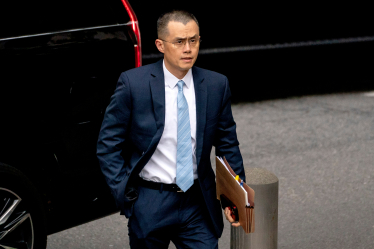
Changpeng Zhao arrives at a federal court in Seattle, U.S., on April 30, 2024. Zhao pleaded guilty to failing to maintain an effective anti-money laundering program at Binance and resigned as CEO of the crypto exchange in 2023. Photo: Getty Images
Cryptocurrency alliance with Trump
The turning point came when Trump's election campaign gained momentum, and the future president himself announced the creation of his own crypto project – World Liberty Financial.
Formally, his plan was simple: to issue a dollar-backed stablecoin, USD1, that would support the global role of the dollar. But there was another side: a stake of about 40% in this company belongs to the Trump family structure, and it receives up to 75% of the proceeds from the sale of the related token WLFI. In 2024, World Liberty earned about $1.4 billion from this. This is more than Trump's traditional real estate business brought in a year.
Binance saw an opportunity and created a special working group within the company to establish a relationship with this project.
The inspiration came from a deal by crypto entrepreneur Justin Sun, who bought $30 million worth of WLFI tokens after the November 2024 election, WSJ sources familiar with the matter told the WSJ. The exchange didn’t rush to buy WLFI like some crypto entrepreneurs did, but it did something more important: it sent more than a dozen of its engineers to develop the technology foundation for USD1.
It was simply technical assistance “so as not to duplicate systems,” but in the end, it was Binance that made the Trump family's stablecoin work as it should, says a World Liberty spokeswoman.
Then came the decisions that dramatically increased the weight of this token. Before the launch of USD1, Binance made an investor from the UAE – MGX, a company headed by the brother of the President of the UAE, Sheikh Mohammed bin Zayed Al Nahyan – buy a minority stake in Binance for $2 billion and pay for it in USD1. This was atypical, because large transactions are usually not made in a new currency that does not even have a history yet. But MGX agreed.
In fact, this meant that World Liberty received a “live” $2 billion, which it put into reserves to maintain a 1:1 exchange rate and could invest in US Treasury bonds, earning up to $80 million per year. After that, USD1 rose sharply in the rankings of the largest stablecoins, and World Liberty itself began to look like a serious player, and this happened thanks to Binance.
The project, which enriched the US president's family, received the strongest boost from Zhao's company.
In parallel, Binance has stepped up its lobbying efforts in Washington. Over the past nine months, the company has spent about $800,000 on American lobbyists, including companies associated with Trump's inner circle. One goal is to explain that under the current administration, Zhao's actions would not be grounds for criminal prosecution at all.
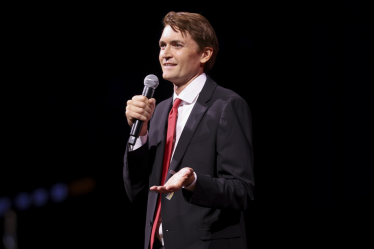
Silk Road founder Ross Ulbricht received a full and unconditional presidential pardon on January 21, 2025. Photo: Getty Images
Pardon as a bargain
On October 23, the White House press secretary announced that Changpeng Zhao had been pardoned. That is, he first served his sentence and then received a full political pardon, which lifted the remaining restrictions.
In the wording of the pardon, it looked like a political U-turn: “The Biden administration’s war on cryptocurrency is over.” Zhao himself had previously said that he had submitted a formal request for clemency only two weeks earlier, when media reports had already appeared that he was looking for a way to come to an agreement with Trump. But behind the scenes, an anonymous source told the WSJ, Zhao’s allies were already nervous because Trump had already pardoned other crypto-related figures, including Silk Road founder Ross Ulbricht.
Inside the US Administration, according to WSJ sources, there was no unanimity. Some officials considered pardoning Zhao a bad idea. It looks as if the US president is granting freedom to a foreign businessman convicted of facilitating money laundering. Moreover, this businessman was helped by a project that brings money to the president's family. Some Republicans and even Trump supporters publicly criticized this.
Trump is selling pardons to anyone who can bring him personal profit, says Democratic Congressman Jerry Nadler. Businessman and investor Joe Lonsdale called it “terrible advice” from his entourage. However, the White House officially stated that neither the president nor his family had a conflict of interest.
For Zhao, the decision was the culmination of a long campaign to “return to normalcy.” It opens the door to removing DOJ oversight (though Treasury oversight will likely remain until 2029), makes it easier to obtain licenses in Europe and the Middle East, removes concerns for investors like MGX, and allows Binance to build a US business again—either through a relaunch of Binance.US or through a different structure.
Moreover, in the year since his guilty plea, Zhao's fortune has only grown: the BNB token has risen in price, American funds have begun buying it as part of a fashionable “cryptocurrency” strategy, and as of today, Zhao controls assets worth at least $80 billion.
A few weeks before his pardon, Zhao even updated his X account description. Instead of ex-binance, it only had the word binance.
Materials on the topic

Category Money Date October 25 “Trump is making the rules more complicated.” The US President pardoned Binance founder Changpeng Zhao. What does this mean for the business of the world's largest crypto exchange and the industry?

Category Richest Date November 23, 2023 “He circumvented the law to conquer the crypto market.” What will happen to Binance and the fortune of crypto billionaire Changpeng Zhao, who faces imprisonment for money laundering?

Category Innovations Date June 15, 2023 Changpeng Zhao's Grey Cardinal. How Heina Chen helped build the Binance crypto empire, which is being attacked by the SEC for possible fraud. Forbes analysis

Category Innovations Date December 05, 2022 “The next step is official crypto regulation.” Binance top manager on money from Iran and Russia, the FTX collapse, and projects in Ukraine

Category Richest Date November 09, 2022 Crypto exchange FTX has collapsed. What will Sam Benkman-Fried, who lost $14.5 billion in a day, do?
